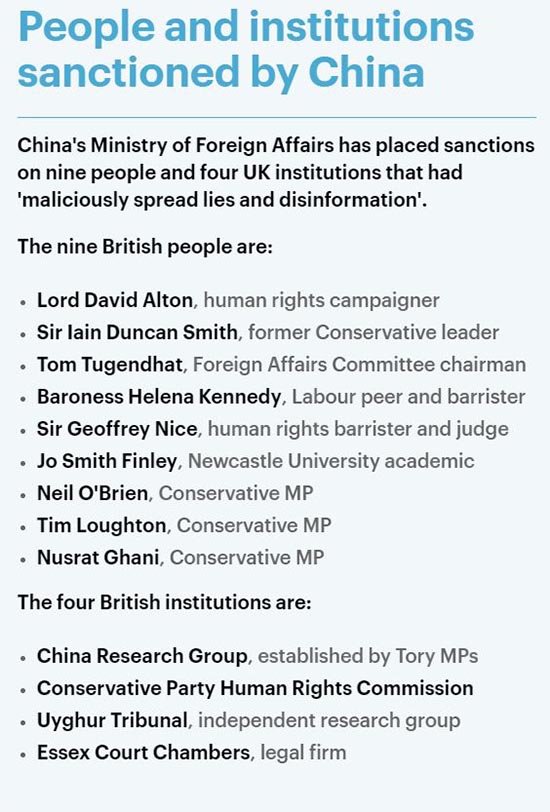
(TibetanReview.net, Mar26’21) – In yet another tit-for-tat move, China has imposed sanctions on nine UK citizens – including five MPs – accusing them of spreading what it called “lies and disinformation” about the country which they had alleged was committing genocide in Xinjiang and bulldozing democratic rights in Hong Kong.
It came as a retaliation for measures taken by the UK government on Mar 22 over human rights abuses against the Uighur Muslim minority group, noted the bbc.com Mar 26.
Sir Iain Duncan Smith, one of the people targeted by China, along with two peers, a lawyer and an academic, has said he would wear the sanctions “as a badge of honour”.
Beijing’s retaliatory move followed similar sanctions it imposed on the European Union, which was part of the co-ordinated action on Mar 22, along with the UK, the US and Canada.
The nine UK citizens sanctioned by China are Tory MPs Sir Iain, Tom Tugendhat, Neil O’Brien, Tim Loughton, and Nusrat Ghani; the peers Lord Alton and Baroness Kennedy; a lawyer, Sir Geoffrey Nice QC, and an academic, Jo Smith Finley.
The sanctions ban them from entering China, Hong Kong and Macau; their property in China, if any, will be frozen and Chinese citizens and institutions will be prohibited from doing business with them.
Former Conservative leader Sir Iain has said: “It is our duty to call out the Chinese governments human rights abuses in Hong Kong and their genocide of the Uighur people.
“Those of us who live free lives under the rule of law must speak for those who have no voice. If that brings the anger of China down upon me then I shall wear that as a badge of honour.”
Likewise, Academic Ms Smith Finley has tweeted: “I have no regrets for speaking out, and I will not be silenced.”
Reacting to UK’s sanctions, a Chinese foreign ministry spokesman has said they “flagrantly breaches international law and basic norms governing international relations, grossly interferes in China’s internal affairs, and severely undermines China-UK relations”.
Xinjiang lies in the north-west of the People’s Republic of China and is its biggest region, albeit an occupied one. Like occupied Tibet, it is autonomous, meaning – in theory – it has some powers of self-governance. But in practice, both face major restrictions by the central government, the report noted.
Actually, the so-called autonomous regions are far more directly and repressively governed than the other provinces of the People’s Republic of China.






